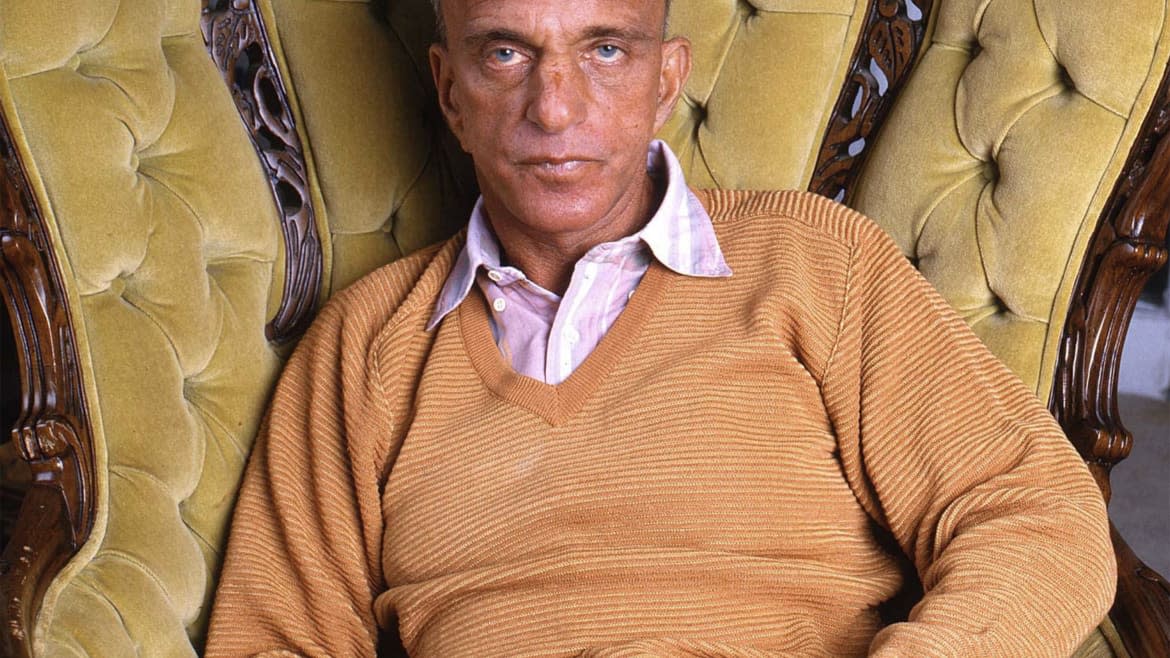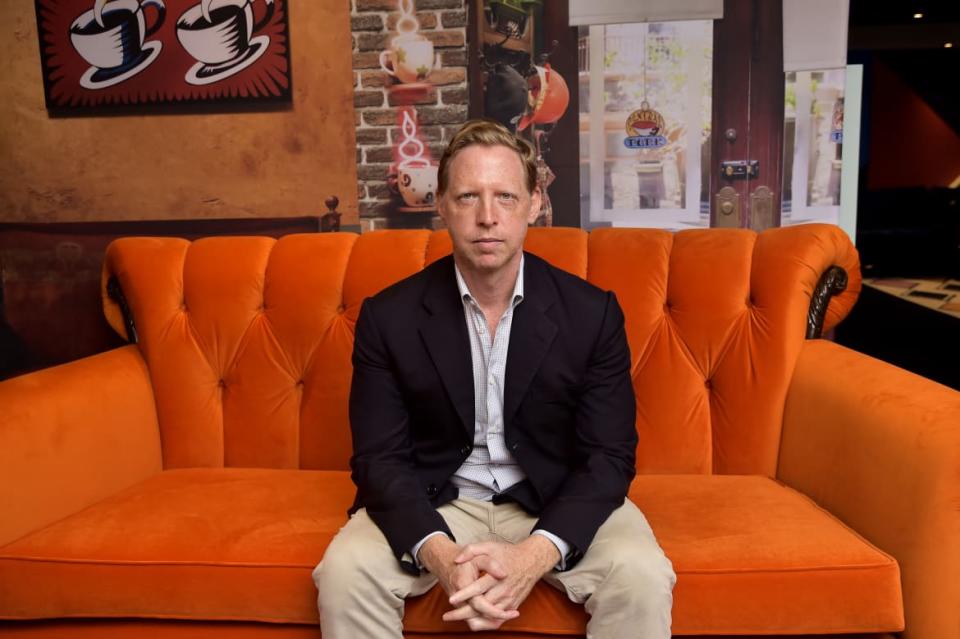The Man Who Made Trump a Monster: Inside ‘Where’s My Roy Cohn?’

In a new documentary, Roy Cohn is called evil, ugly, corrupt, indecent, a hypocrite, a puppeteer, a liar, and a demagogue. And that is by his family and friends. Roger Stone, of all people, refers to him as “one of the most controversial people in the country.”
So what does it say, then, that at one of the most vexing, stressful, and nearly impeachable moments in his presidency, it is reported that Donald Trump called out to his aides, “Where’s my Roy Cohn?”
At a moment of crisis, Trump cried out for his former friend, personal lawyer, and fixer. Some might characterize it as the president attempting to summon a demon.
“Everyone’s curious about what makes a monster,” says Matt Tyrnauer, the director of the new documentary that takes its name from that incident, Where’s My Roy Cohn? In the film, which will be released Friday, audiences get two origin stories for the price of one.
Before he died of complications from AIDS in 1986, Cohn lived a life of such public infamy that a rundown of his most notorious acts would more believably describe the arch villain of a comic series were they not so horrifically real, and the repercussions not so deeply felt.
He arrived to prominence at only 23 years old as the prosecutor in the trial of accused spies Julius and Ethel Rosenberg, blithely discounting ethics in order to secure not only convictions, but the death penalty for the married couple, despite insufficient evidence. Thus was birthed his reputation as a lawyer who could literally strap someone to an electric chair.
He would later serve, as one former colleague calls it, as “McCarthy’s handmaiden,” the right-hand man to Joseph McCarthy’s Communist witch hunt in the 1950s. As he got older, he would become a fixture among New York’s richest and, by extension, most corrupt. He was a power broker for both the underworld and the legitimate political world, standing on the bridge between mobsters and crime bosses and the politicians and businessmen who dealt with them.
His lack of scruples would become the stuff of legend and, among the benefactors of his pugnacious ways, reverence, as he surrounded himself with media moguls, stars, and the most prominent people in the country, including the Reagans.
His hypocrisy would also prove prolific, as dramatized in Tony Kushner’s seminal play, Angels in America. He started his career by persecuting gay government employees while living as a closeted gay man himself. His voracious sexual appetite was fabled: a different partner each day, according to some rumors. He denied that he was gay and that he had contracted AIDS until his dying day, though he happily accepted the Reagans’ assistance in getting him experimental treatment for the disease.
Then there’s the reason for revisiting all this at all: a fateful meeting with Donald Trump at New York’s Le Club when Trump was 23. He hired Cohn to represent him against a lawsuit alleging that his real estate company was barring black New Yorkers from living in its buildings. Trump settled, adopting the chief rule in the Cohn playbook for himself: Never admit you’re wrong, and never apologize.

Matt Tyrnauer during the Toronto International Film Festival 2019 at Hotel Le Germain on Sept. 6, 2019, in Toronto, Canada."
The story is that Cohn would coach Trump in how to keep authorities off his track while engaging in shady business dealings, and how to manipulate the media while embroiled in controversy: If all else fails, start blaming and bullying other people. More, Cohn’s fame proved you could cast yourself as a lovable scoundrel and the media would in turn cast you as a star.
“Roy Cohn created a president from beyond the grave,” Tyrnauer says. “It’s almost an absurd statement to make, but in this case is true. With the election of Trump, Cohn goes from being a footnote in American history to being a modern Machiavelli, which is an astonishing phenomenon.”
It also should be a cautionary tale.
“Trump is a symptom of the darkest tendencies in our populace to take advantage of a system and exploit it for personal gain rather than the greater good,” Tyrnauer says. “That this country was capable of electing him president and not systematically rejecting him is a really terrifying thing.”
We’re speaking over lunch at the Nomad Hotel several days before Where’s My Roy Cohn?’s official release. The last time we spoke was before the release of his last documentary, Scotty and the Secret History of Hollywood, about a 95-year-old former gigolo who once operated a brothel out of a gas station and claimed to have slept with dozens of Hollywood’s biggest stars, including bombshell revelations about Cary Grant and Spencer Tracy.
Tyrnauer appears a bit more weathered this go-round, at least emotionally, having consigned his last year to what he refers to as the “miasma of uncleanliness” of Cohn’s life. Now he’s standing shell-shocked in the aftermath of that deleteriousness. The world as we know it today. Trump’s America.
“To understand the flaws in our system and the national psyche that could give rise to someone like [Trump] is of deep importance,” he says. “That’s why I made this movie, so you could see the cartographer of Trump’s map. If you understand the methods to the madness, there will be more of a chance of eradicating those tendencies going forward.”
Many described Cohn as a mentor to Trump. Some have gone as far as to refer to him as Trump’s surrogate father. Tyrnauer says he was shocked by how many people he interviewed who point-blank said that Donald Trump is Roy Cohn. “Another person said Donald Trump swallowed Roy Cohn whole.”
Where’s My Roy Cohn? isn’t a documentary about Donald Trump. Cohn’s relationship with him is overtly referenced for only a brief portion of the film, which chronicles Cohn’s entire life, though the impact Cohn had on the current political system is obliquely referenced throughout. Without hitting you over the head with it, then, Where’s My Roy Cohn? is a documentary about Donald Trump’s America.
“If there's any silver lining to all of this, it's that it has exposed the dark side of our political system, which in the wake of the civil rights movement and Watergate really was driven underground,” Tyrnauer says. “The paranoid style of American politics and the specter of dirty politics, we're always vaguely aware of it. But we never thought that it would rise up again and be so above ground.”
With everything that was known about Trump, his actions, and his character, he was still elected. “We know that among the electorate, approximately 40 percent will vote for a dangerous demagogue, an incompetent man,” Tyrnauer says. “That’s actually helpful information. What we do about it is the question.”
Trump and Cohn are cut from the same cloth, a master and his student—a student who some argue has outclassed his teacher.
“They're narcissistic, selfish, self-interested, mob-adjacent gangsters who are so effective at manipulating to positions of power that they end up affecting all of our lives,” he says. “If we don't pay attention to those people and their skills and we don't move to eradicate them from public life, we're in very, very deep trouble. It seems like the guardrails of democracy are much more fragile than we ever thought they were.”
Just months prior to his death, Cohn was disbarred for ethical violations. Barbara Walters, William F. Buckley Jr., and Trump himself were among the dozens of high-society folk who spoke as character witnesses on his behalf. From politicians to media figures, the people who should have been keeping a watchful eye on him and exposing him were instead cavorting with him on his yacht, in the Hamptons, and at dinner parties—certainly a recognizable dynamic today, whether you are talking about Trump or the Jeffrey Epsteins of the world.
Tyrnauer relays with disgust the number of liberal people he interviewed for the film in New York who had personal dealings with Cohn and argued that his magnetic personality and loyalty justified their acquaintance with him in spite of the Rosenbergs, in spite of McCarthy, in spite of his hypocrisy in persecuting gay people, in spite of the corporate malfeasance, in spite of Trump.
“I don’t understand it,” he says.
In the film, he interviews one of Cohn’s former colleagues, who says, “Roy was responsible, according to Roy, for everything important that happens in the United States.”
“I think people back in his day would have thought that was hyperbole, but now unfortunately I think it’s proven to be true,” Tyrnauer says, smiling and offering what may be his only praise of Roy Cohn in the hour that we meet: “That’s quite a trick from 33 years beyond the grave.”
Got a tip? Send it to The Daily Beast here
Get our top stories in your inbox every day. Sign up now!
Daily Beast Membership: Beast Inside goes deeper on the stories that matter to you. Learn more.

